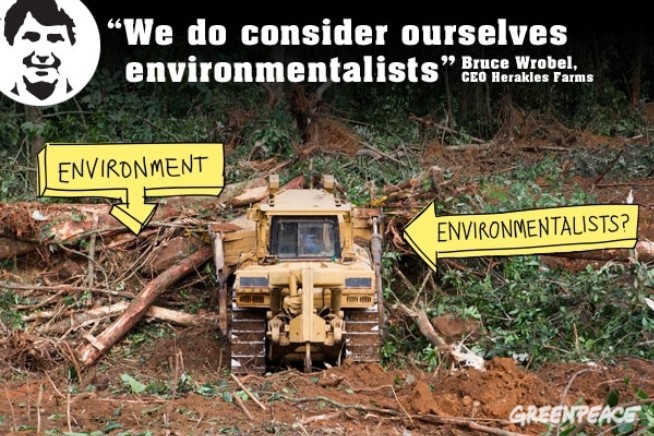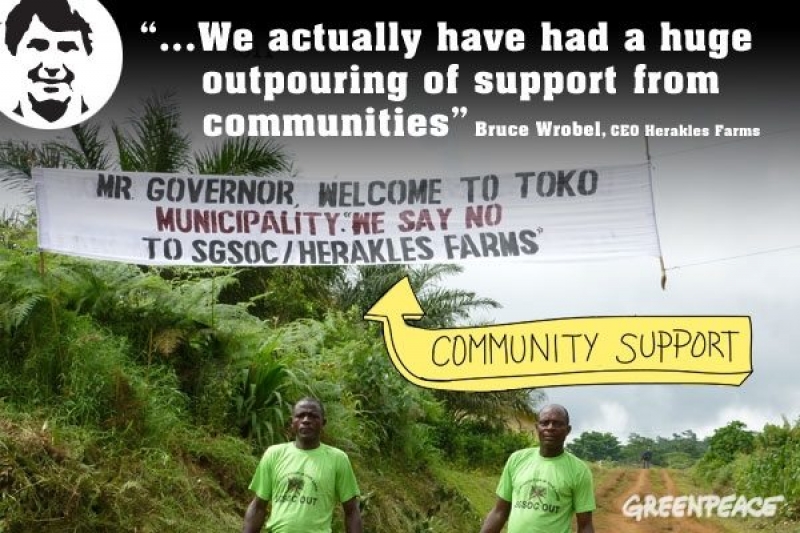US Company Withdraws Sustainability Application for Oil Palm Plantation in Cameroon
By Pratap Chatterjee
Herakles Farms, a subsidiary of the New York-based investment firm Herakles Capital, has withdrawn its application to join the Roundtable on Sustainable Palm Oil (RSPO) after a coalition of environmental and human rights organizations called attention to the reality of its exposed its proposed 73,000-hectare palm oil plantation in Cameroon. They exposed the project for what is: bad for the environment and bad for the people.
Unsurprisingly, the company has since denied the allegations, claiming instead that its decision to withdraw was based on a need to plant seedlings from the nursery to the field. However, the NGOs who filed the complaint--and the local communities whose livelihoods are threatened by the massive project--know better.
Herakles Farms, which claims to be “addressing a dire humanitarian need,” is developing its palm oil plantation through a 99-year land lease that was obtained by "SG Sustainable Oils Cameroon, Ltd. (SGSOC), a company that is wholly-owned by Herakles Capital, observes Corpwatch.
The company has never consulted or gained the free, prior and informed consent of many local communities. Instead, Herakles has chosen to pretend that it did.
The company has also fought hard to portray itself as pro-environment, bu that too, couldn't be further from the truth. “From its very name, American-owned [SGSOC] presents a pro-environment, pro-resources image,” writes Frederic Mousseau, policy director of the Oakland Institute in a new reportthat was just released. “(But it) is also part of a strategy to deceive the public into believing that there is logic to cutting down rainforests to make room for palm oil plantations.”
A notable part of that strategy involves an impressive-sounding partnership with All for Africa, an NGO that's ostensibly dedicated to poverty reduction. The NGO promises to bring additional development to the region through the use of palm oil revenue. It has also expresses a commitment to plant trees in the region. It's all well and good; but there's one small problem: The NGO is habitually silent when it comes to the fact that the plantation will cause major deforestation and loss of biodiversity. It also takes great care to navigate around any local and internationalopposition to the project.
Now for a reality check: Bruce Wrobel, the CEO of Herakles, is also the director at All for Africa.
“The Herakles Farms plantation project in Cameroon is an example of the wave of land investments in Africa that have previously been exposed by the Oakland Institute", said Frederic Mousseau. Once again, the investor is deceiving the public into believing that forests must be cut down and small farms erased in order to alleviate hunger and poverty. International attention needs to be mobilized to support local opposition and prevent future resource grabs."
There is considerable local opposition, despite claims to the contrary.
A newly released film by the Oakland Institute, “The Herakles Debacle”, puts a welcomed spotlight on that opposition and documents the scope of destruction that the project will cause.
“Plantation jobs have always been modern day slavery,” says Joshua Osih of the Social Democratic Front, Cameroon’s main opposition party, in an interview for the film. “We’ve seen a lot of industrial plantations develop around this area and nothing, absolutely nothing, has happened positively to the population.”
“Everybody here is self employed,” Okie Bonaventure Ekoko, a cocoa farmer from Mboko village told the film maker, Franck Bieleu. “There is no advantages that the people here will have (from Herakles investments). We don’t need them, we are fine.”
“And if they come and say they want to take this land from us, we are not ready for it,” says Esoh Sylvanus Asui, a farmer from Bombe Konye village. “We will fight and we will die for our land.”
Local opposition is on the rise, notes Cultural Survival. At the recent Meangwe II meeting in Cameroon, a wide range of people came together to make their position clear. The meeting brought together Elders, Traditional title holders, farmers, teachers, community leaders, hunters and NGOs from the different villages in and around the proposed plantation.
In their final statement (PDF), participants of the meeting rejected a number of the company's false claims by Herakles, They further rejected the theft of their lands and the destruction of their livelihoods, the burden of which they will be forced to carry on their own, while the company prospers.
No amount of greenwashing can change the facts.


